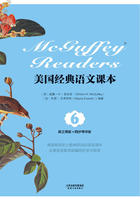
LESSON 35
HENRY V. TO HIS TROOPS
William Shakespeare, 1564-1616, was born at Stratford-upon-Avon. By many (perhaps most) critics, Shakespeare is regarded as the greatest poet the world has ever produced; one calls him, “The most illustrious of the sons of men.” And yet it is a curious fact that less is really known of his life and personal characteristics than is known of almost any other famous name in history. Over one hundred years ago, a writer said, “All that is known with any degree of certainty concerning Shakespeare is—that he was born at Stratford-upon-Avon—married and had children there—went to London, where he commenced acting, and wrote poems and plays—returned to Stratford, made his will, died, and was buried.” All the research of the last one hundred years has added but very little to this meager record. He was married, very young, to Anne Hathaway, a woman eight years his senior; was joint proprietor of Blackfriar's Theater in 1589, and seems to have accumulated property, and retired three or four years before his death. He was buried in Stratford Church, where a monument has been erected to his memory; he also has a monument in “Poet's Corner” of Westminster Abbey. His family soon became extinct. From all we can learn, he seems to have been highly respected and esteemed by his cotemporaries.
His works consist chiefly of plays and sonnets. His writings show an astonishing knowledge of human nature, expressed in language wonderful for its point and beauty. His style is chaste and pure, judged by the standard of his times, although expressions may sometimes be found that would not be considered proper in a modern writer. It has been argued by some that Shakespeare did not write the works imputed to him; but this theory seems to have little to support it. This extract is from King Henry V., Act III, Scene I.
Once more unto the breach, dear friends, once more;
Or close the wall up with our English dead.
In peace there 's nothing so becomes a man
As modest stillness and humility:
But when the blast of war blows in our ears,
Then imitate the action of the tiger;
Stiffen the sinews, summon up the blood,
Disguise fair nature with hard-favored rage;
Then lend the eye a terrible aspect;
Let it pry through the portage of the head
Like the brass cannon; let the brow o'erwhelm it
As fearfully as doth a galled rock
O'er hang and jutty his confounded base,
Swilled with the wild and wasteful ocean.
Now set the teeth, and stretch the nostril wide,
Hold hard the breath, and bend up every spirit
To its full height! On, on, you noblest English,
Whose blood is fet from fathers of war proof!
Fathers, that, like so many Alexanders,
Have, in these parts, from morn till even, fought,
And sheathed their swords for lack of argument;
Be copy now to men of grosser blood,
And teach them how to war.
And you, good yeomen,
Whose limbs were made in England, show us here
The mettle of your pasture; let us swear
That you are worth your breeding, which I doubt not;
For there is none of you so mean and base,
That hath not noble luster in your eyes.
I see you stand like greyhounds in the slips,
Straining upon the start. The game's afoot;
Follow your spirit: and, upon this charge,
Cry— “God for Harry, England, and St. George! ”
 STUDY GUIDE
STUDY GUIDE
A. Vocabulary of War—Answer the following questions regarding vocabulary from the play.
1. In the first line, “the breach” refers to replacing those who have fallen in battle. How do you think it feels to do this?
2. To imitate is to copy. In war, why should soldiers “...imitate the action of the tiger”?
3. To show your mettle is to demonstrate how brave you are. Why is this important in war?
4. If someone has “noble luster in your eyes”, this person's eyes shine brightly. Why is this quality important for a soldier?
5. “The game's afoot” means the battle is starting soon. How would you feel if your leader told you this?
B. Comprehension Questions—Answer the following questions.
1. Do you think Henry V. was a good leader? Explain.
2. How does Henry V. make his troops ready for war?
3. What qualities does Henry V. say his soldiers have?
4. Who is a good leader that you know about? Tell about him or her.
5. Who were the English army fighting against at this time?
C. Word groups—Using the clues, fill in the correct words from the play.
1. animals: t ____, g _________
2. body parts: ears, e __, h ___, t ____, n ______, l ____
3. weapons: c _____, s ____